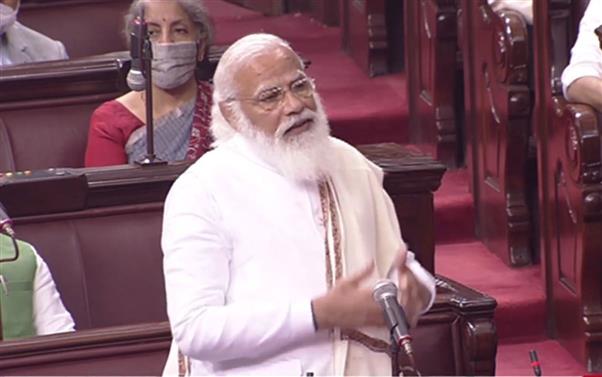Manas Dasgupta
NEW DELHI, Feb 8: The prime minister Narendra Modi on Monday issued a fervent appeal to the agitating farmers to end their stir and return to the negotiation table for a solution to the impasse created over their demand for the repeal of the three contentious farm laws and the government flatly refusing it.
“Give these reforms a chance,” he said, while claiming that most of the opposition parties who are supporting the agitation now were in the past in favour of bringing out agricultural reforms on the same lines the three acts enacted by his government had done.
Replying to the debate in the Rajya Sabha on the motion of thanks to the president for his address to the joint session of Parliament, Modi slammed those calling names to the farmers’ agitation including branding them“Khalistani” and said the country was proud of the contributions made by Punjab and Sikhs for national building and nation’s security and calling them by such names would not do any good to the country.
The prime minister’s appeal, however, stood rejected by the agitating farmers who said they were ready for talks with the government if invited but the agitation would not end till the government give legal guarantee on the Minimum Support Price (MSP) and agree to repeal the three acts.
The Bharatiya Kisan Union spokesman Rakesh Tikait, who has emerged as the main rallying point in the farm agitation told media persons at Ghazipur border, “Desh mein bhook pe vyaapaar nahi hoga. Bhook kitni lagegi anaaj ki keemat utni hogi. Desh mein bhook se vyaapaar karne walon ko baahar nikaala jaaega (There will not be business over hunger in the country. If hunger goes up, price of crops will be decided accordingly. Those wanting business over hunger will be driven out of the country),” he asserted. His reference was to the apprehension that the three acts would give an open field to the corporate houses dealing in agricultural crops and they would make hunger the capital of their business hiking prices at their free will. Tikait maintained that the price of crops would not be allowed to be decided the way the rates of a flight ticket fluctuate several times a day.
Several leaders of the Samyukta Kisan Morcha, the umbrella organization of the 40 odd farmers’ unions participating in the agitation said they were ready for talks with the government but there would be no compromise on legal guarantee to MSP. “When Modi is reiterating that the MSP will stay, what is the problem for the government to enact a law in this regard?” they asked.
The farmer leaders’ reaction came after Modi vehemently denied that the laws would end MSP or the mandi system of crop procurement.
“MSP was there (in past). MSP is there (now). MSP will remain in the future,” he said. “Also, affordable ration for the poor (through the public distribution system) will continue,” he said, adding that mandis will be modernised.
Questioning opposition parties for their “U-turn” on agriculture reforms, the Prime Minister also quoted his predecessor Manmohan Singh on the on the need for reforms in the farm sector and quoted, “Manmohan ji is here, I will read out his quote. Those taking a U-Turn (on farm laws) will perhaps agree with him. ‘There are other rigidities because of marketing regime set up in 1930s which prevent our farmers from selling their produce where they get highest rate of return. It is our intention to remove all those handicaps which come in the way of India realising its vast potential at one large common market,’” Modi said quoting the former prime minster. To the Congress members he said, “You should be proud that Modi is implementing Manmohan Singh’s dream.” he added.
He also said that former union agriculture minister Sharad Pawar and previous Congress governments have supported and implemented agricultural reforms in some form or the other.
“Sharad Pawar ji, and those from Congress, everyone… all governments have stood for agricultural reforms. Whether they were able to do it or not, but everyone has advocated that it should be done,” Modi said.
He also slammed the mushrooming of a new breed of “andolan-jivi” — professional protesters — who can be seen at every agitation. These “parasites feast on every agitation.” To this, however, Tikait said, “Yes, this time it is the farmers’ community which has emerged and people are also supporting the farmers” while Shiv Kumar Kakka, who is a senior member of the Morcha said, “Agitation has an important role in democracy. People have a right to oppose the government’s wrong policies,” Kakka said.
Punning on the term FDI, which stands for Foreign Direct Investment, Modi said a new thing of FDI has emerged in India, which he said was Foreign Destructive Ideology.
“We need to be more aware to save the country from such an ideology,” he said.
Reeling out statistics to explain the benefits of the new acts, Modi said over two-third of farmers have small landholdings and the new laws give them the freedom to sell their produce anywhere, helping to realise the best prices. Modi also criticised the opposition for not listing out the reasons that prompted the stir against the farm laws.
Tikait, in response, however, slammed the government’s attempt to divide the agitators on caste and religious basis. “This movement was first portrayed as Punjab’s issue, then Sikhs’ then Jats, so on and so forth. The farmers of the country are united. There is no small farmer or big farmer. The movement belongs to all farmers,” he said.

